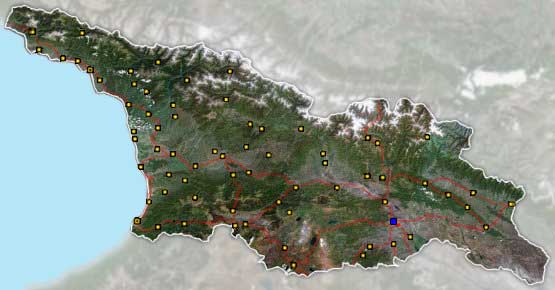History and facts of the country Georgia
History of the country Georgia
Georgia, an exquisitely beautiful country, is ringed by the Caucasus Mountains and set at the crossroads of Europe and Asia. It lies between the Black and Caspian Seas and has borders with Turkey, Russia, Armenia, and Azerbaijan, along the Silk Road of ancient times. Since recorded time, Georgians have been famous for their hospitality to strangers.
The visiting ancient Greeks knew Georgia as the land of the Golden Fleece. It was a woman, St. Nino, who brought Christianity to Georgia in 330 A.D. Georgian wine has been produced for over 8000 years and Georgian literature dates back to the fifth century A.D. Scholars have compared the 12th-century Georgian poet Shota Rustaveli to Dante and Shakespeare.
The Caucasus is a truly surprising place! And Georgia is the heart of this region. The history of Georgia is very interesting and partly sad. This small mountainous territory east of the Black Sea is a crossroad of Western and Eastern cultures. The territory that modern Georgia occupies, has a perfect geographical location. That's why many foreign empires were attracted by this country. Greeks, Romans, Byzantines, Turks, Persians, and so on. A lot of really powerful empires used to conquer this beautiful land. But these unique, brave, and majestic people could defend their independence and they can be proud of a great deal. So visit this country and touch the mysterious atmosphere of the proud country Georgia.
Location and the map of the country Georgia
Georgia is often the starting point for tourists visiting the Caucasus. From Georgia, they travel to Armenia and Azerbaijan. You can use the table with distances and duration of travel from Tbilisi to the touristic destinations within Georgia and the table for traveling to Baku and Yerevan.
Distances to the tourist destinations
| Travel from Tbilisi to Batumi | 380 KM | 6 hrs |
|---|---|---|
| Travel from Tbilisi to Gori | 90 KM | 1.5 hrs |
| Travel from Tbilisi to Gudauri | 130 KM | 2.5 hrs |
| Travel from Tbilisi to Kutaisi | 230 KM | 3.5 hrs |
| Travel from Tbilisi to Mestia | 470 KM | 8 hrs |
| Travel from Tbilisi to Mtskheta | 30 KM | 0.5 hrs |
| Travel from Tbilisi to Telavi | 100 KM | 2 hrs |
| Travel from Tbilisi to Vardzia | 270 KM | 4 hrs |
| Travel from Tbilisi to Ushguli | 520 KM | 11 hrs |
Map of the country Georgia

| Travel from Tbilisi to Baku | 580 KM | 7.5 hrs |
|---|---|---|
| Travel from Tbilisi to Yerevan | 300 KM | 5 hrs |